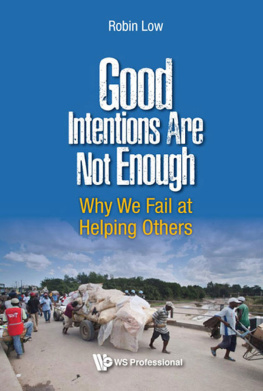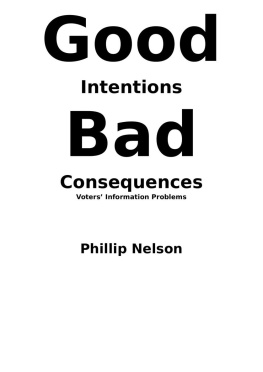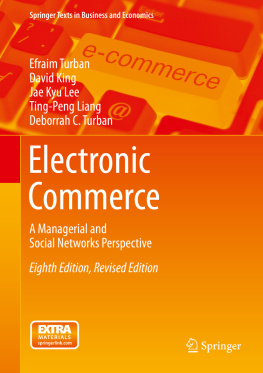

Published by
WS Professional, an imprint of
World Scientific Publishing Co. Pte. Ltd.
5 Toh Tuck Link, Singapore 596224
USA office: 27 Warren Street, Suite 401-402, Hackensack, NJ 07601
UK office: 57 Shelton Street, Covent Garden, London WC2H 9HE
National Library Board, Singapore Cataloguing-in-Publication Data
Name(s): Low, Robin, author.
Title: Good intentions are not enough : why we fail at helping others / Robin Low.
Description: Singapore : World Scientific Publishing Co. Pte. Ltd., 2016.
Identifier(s): OCN 958963351 | ISBN 978-981-32-0057-9 (paperback) |
ISBN 978-981-32-0056-2 (hardcover)
Subject(s): LCSH: Philanthropists Singapore -- Biography | Social service Singapore |
Humanitarianism.
Classification: DDC 361.74092 --dc23
On the cover: Border crossing at Dajabn market, Dominican Republic. Located on the border with Haiti. Robin Low.
Copyright 2017 by World Scientific Publishing Co. Pte. Ltd.
All rights reserved. This book, or parts thereof, may not be reproduced in any form or by any means, electronic or mechanical, including photocopying, recording or any information storage and retrieval system now known or to be invented, without written permission from the publisher.
For photocopying of material in this volume, please pay a copying fee through the Copyright Clearance Center, Inc., 222 Rosewood Drive, Danvers, MA 01923, USA. In this case permission to photocopy is not required from the publisher.
Desk Editor: Shreya Gopi
Typeset by Stallion Press
Email:
Printed in Singapore
About the Author

Robin Low is the co-founder of Civil Innovation Lab, promoting social impact through civil action and local innovation. The Lab runs in collaboration with various universities including Stanford University to enhance efficiency and impact on social initiatives.
He is also the principal consultant at the Patatas, advising corporations on CSR projects with real social impact, and promoting a new level of corporate/civil partnership to solve the worlds pressing problems.
Robin co-founded Relief 2.0, which promotes sustainable disaster recovery, by engaging, empowering, enabling and connecting survivors to the support they need. His work has taken him to more than 20 countries, where he shares how arts and craft, for example, can help communities support one another in times of disaster. Robin is also working on the post-earthquake recovery of Nepal.
Robin owns Greenyarn LLC, a nanotechnology company based in Boston which manufactures sustainable socks, fabric and apparel for environmentally conscious consumers. He also founded Doing.gd, a social movement to help make volunteering and doing good easy, and is a mentor at Grameen Creative Labs.
1.Introduction
Many people mean well and want to contribute solutions to local and global needs. People often want to act for the sake of doing something. Often, this means poorly thought-out ideas that are often unsustainable, or have little measurable social impact. Are these efforts actually helping? Are they solving problems or creating new ones? What pitfalls should a concerned giver watch for?
I was in New York City in 2001. I went to the World Trade Center shortly after it collapsed and Ive been involved in large scale disasters ever since. Initially, it was just volunteering for some of them, and working with charities and nongovernmental organizations (NGOs) on the ground.
I am very passionate about new processes, ideas and technology. Getting involved in different businesses lets me continuously learn new skills and challenge myself in new tasks. When I started actively going to disaster areas, it allowed me to experience different communities in a harsh and extreme setting where decisions need to be made quickly and decisively. I do learn a lot from every experience, and whats more, the knowledge that you have impacted someones life or saved a community of people makes your work there feel especially important, much more than anything else that you do day to day.
In 2008, I had various business setbacks. My father passed away and I had various bills to pay along with a foreclosure. Many of my companies were affected and my rich friends and business partners avoided me. It was a painful experience to sell away a lot of what I owned, walking away from a big property investment and terminating my rental lease in various countries.
My gamer friends and academic friends were very supportive and helped me readjust to a new lifestyle where I had more time to do what I enjoy doing, and focused less on making money just to pay for my large expenses.
With more time, I could also examine a lot of my life choices and ask many questions, as well as search for answers. At this time, I found many new passions which I got involved in, and one of them was social entrepreneurship. It felt like a brilliant idea where you can do good while make money, and I thought to myself, Why is everyone not doing this?
Rich People are Not the Solution
Ive known many rich people who do not consider themselves rich. These people I know live in properties that cost in excess of US$25 million, run foundations or own businesses, and continue to generate a lot of income. Through my interactions with them, I have realized that most of them still have a lot of anxieties anxieties relating to financial security.
Often, when I approach these people who run foundations, Ive candidly asked them why they dont do more for society personally, and I get the same answer all the time: You know, the costs of education and necessities are getting more day by day, my businesses may be doing well now, but who knows what is going to happen tomorrow? Sometimes, I do get puzzled as the small projects that I wish to be funded are under $10,000, and their response of financial insecurity in their Rolls Royce prompted me to follow up with another question: So how much do you need to have in order to be financially secure? The quick answer is often $1 billion in the bank.
Many people talk about doing social good, creating social impact, and many of them have the means to do it. Some who run foundations will get their foundation to be involved, but foundations usually do not spend time on small-scale prototypes, and many rich people do not seem to be financially secure enough to part with some money.
Ive met public servants earning more than US$1 million dollars a year, refusing to support an educational project for local youths and who pointed me to government grants which either take too long to apply for, or simply are not the right match.
If you are in the business of fund-raising, you often get this common reply: Ill donate more next time when I have more money. Boston College did a study on the Fears of the Super Rich, and found that even people with an average net worth of US$78 million are dissatisfied with their sizable fortunes.
So if you think that you will donate only when you are rich, the question you should ask yourself is, how much money do you need before you can consider yourself rich?


 Robin Low is the co-founder of Civil Innovation Lab, promoting social impact through civil action and local innovation. The Lab runs in collaboration with various universities including Stanford University to enhance efficiency and impact on social initiatives.
Robin Low is the co-founder of Civil Innovation Lab, promoting social impact through civil action and local innovation. The Lab runs in collaboration with various universities including Stanford University to enhance efficiency and impact on social initiatives.











